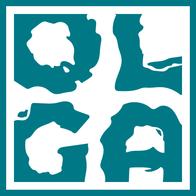Dear readers
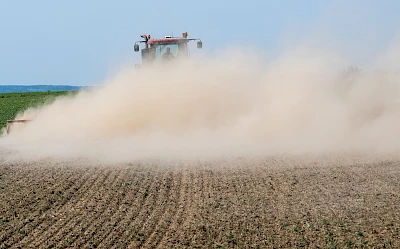
The summer of 2022 is running and the next heat wave is slowly smoothing its waters again. The never-ending drought has already led to high crop losses in agriculture. In addition to the critical climatic situation, there is an equally tense geopolitical situation due to the war of aggression that Russia's President Putin has been waging against Ukraine since the end of February, causing energy and food prices to skyrocket worldwide. People suddenly seem to be even more interested than before in regional cycles, whether in the form of local heating networks or regional cultivation concepts to compensate for the lack of wheat and other food imports from Ukraine.
Especially now, Stadt-Land-Plus and other research projects are called upon to provide answers to the increasingly urgent questions of our time, which we have been asking ourselves not only since the beginning of the Corona pandemic: How can we create sustainable regional cycles of recyclables and value creation that make us - at least partially - independent of the global markets? Not to mention climate change, which demands regenerative use concepts from us for cities and rural regions so that we do not end up losing our natural resources and food bases completely. In the OLGA project, we are working on these concepts and would like to contribute to more knowledge for sustainable agriculture and regional value-added relationships between cities and their surrounding areas.
In this issue of the newsletter, we provide an overview of the results of the survey "How regional is your food purchase?" conducted in Dresden and the region in 2021, show the first evaluations of the studies on agroforestry structures by small water courses regarding microclimate and woody plant physiology, reflect on the series of events of the OLGA focus groups in 2022, report on the first networking event of the City of Dresden with the TU Dresden on the topic of sustainability, and present sustainable farming initiatives and other projects and funding opportunities in the Dresden region, Saxony and Germany.
We hope you enjoy reading this issue and wish you a wonderful summer despite the circumstances.
the OLGA project team
How regional is your food purchase?
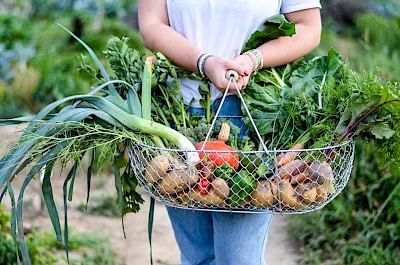
From June to October 2021, the TU Dresden and the Umweltzentrum Dresden e. V. designed and carried out a survey on the current supply of regional products on offer in groceries, farmer's markets and restaurants in Dresden and the surrounding area. During this time, citizens were asked to use an online questionnaire to ask the staff of the restaurants and/or grocery shops or farmer's markets they usually visit about the regionality of the products they offer. By participating in the survey, the aim was to raise awareness among consumers as well as processors and marketers for the use of locally produced food.
Agricultural wood structures along watercourses
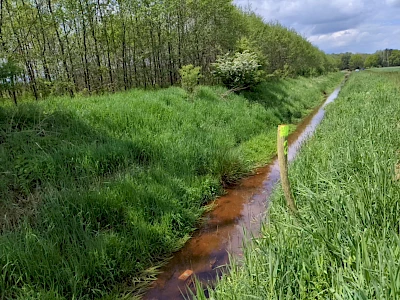
In OLGA, agroforestry systems along watercourses are being studied on two sites in Peickwitz (Brandenburg) and Klingenberg-Colmnitz (Saxony) with regard to their microclimatic effects on the watercourse itself, the soil and the immediate surroundings. In addition to climatic analyses, further analyses are carried out on woody plant physiology, vegetation diversity and biomass growth. Selected results from the last year are presented within the article.
Perspectives for Sustainable Land Use and Regional Value Creation - Review of the OLGA Focus Groups 2022
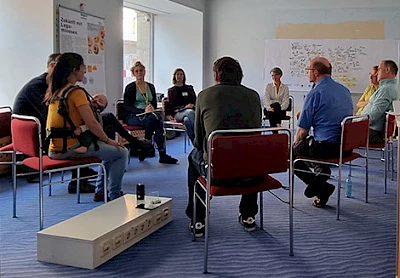
The OLGA focus groups brought together stakeholders from the city and the region, especially from administration, agriculture, processing and marketing, and (agricultural) extension. Some interesting points of contact and ideas for future projects in the Dresden region emerged. We look back on the series of events and at the same time dare to look forward to what is to come.
Aromatic mini meals from pulses
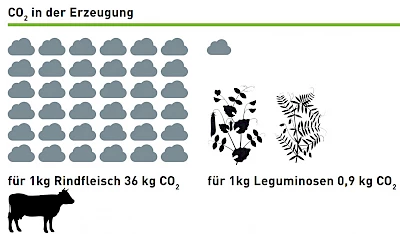
Climate change is advancing rapidly. All people and economic sectors, especially agriculture and the food industry, are called upon to reduce CO2 emissions to a minimum. Legumes, also known as pulses, are to be given more input into the human diet in Saxony. The regionalisation of value-added relationships and legumes as a field crop can play an important role in this. The EIP-AGRI project, which is funded by the European Union, is developing a regional value chain for tasty mini-meals consisting of a gluten-free dough base with legume content and different spicy fillings. From regional cultivation of the legumes to processing in regional mills and marketing in bakeries in the region, a new value chain is thus being developed. Legumes have a high nutritional value and offer diverse options for expanding the food market towards climate-friendly, healthy and sustainable nutrition.
The "Legumes in Saxony" Working Group with its lead partner Quendt Food Innovation KG is realising the project together with project partners from the fields of agriculture, agricultural and food technology, bakery, education and marketing. In the project, impulse models, structures and processes up to sales
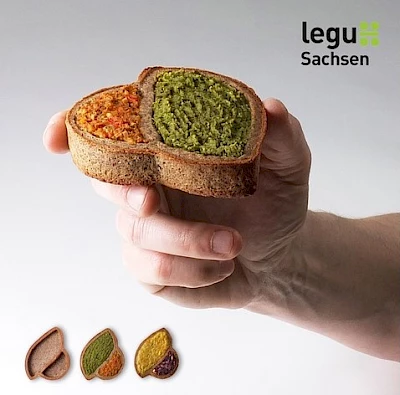
training concepts are developed. At the end of the project in 2023, large-scale cultivation and processing of legumes as well as the production of advanced products from legumes for human nutrition and their customer-oriented, area-wide marketing will begin in Saxony.
OLGA supports Quendt Food Innovation KG in promoting and marketing the mini-meals in Dresden and the region. We establish relationships bteween farmers who grow the relevant pulses and processors - even beyond the existing value-added relationships. Last but not least, we try to mix pulses among the people as a valuable meat alternative.
Development of sustainable forms of participation and financing for the regional agriculture and food industry
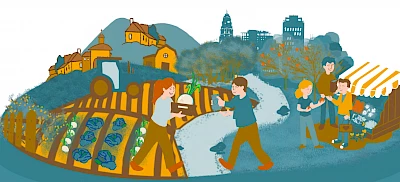
Money and finance play an important role in shaping the transformation of society as a whole, including in the agricultural and food sector. The current market economy system, including European, national and regional support measures, is still aimed at maximising profits and growth instead of promoting efficient enterprises with sustainable management strategies. The OLGA project creates and supports sustainable forms of participation and financing for start-ups and existing companies that are disadvantaged in traditional bank financing due to their strong value orientation compared to typical business models.
What goes "sustainably" in Dresden?
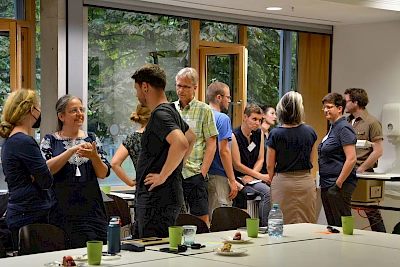
It has been talked about for a long time, now at the end of June 2022 it came to the first "Come Together": Stakeholders from the City of Dresden and the TU Dresden met at the latter institution for the workshop "What's sustainable in Dresden?" as part of the TUD Sustainability Week. The meeting was organised by the Green Office of TU Dresden and Zukunftsstadt Dresden, which has been funded by the Federal Ministry of Education and Research since 2015 and has so far produced a number of sustainable citizens' projects and initiatives.
Shaping the agricultural turnraround collectively
 As a Stadt-Land-Plus project OLGA is particularly interested in the relationship between the urban and the rural. Be it in the form of a value-added relationship between a rural producer and an urban marketer or in the form of a friendly relationship between people from city and village who want to shape the countryside sustainably together and learn from each other. Permagold eG has set itself the goal of producing healthy food, ecologically valuable in regenerative agriculture. In harmony with biodiversity, the protection of the climate, the soil as well as the groundwater, people should have access to food full of flavour from regional production. With its first farm in Nebelschütz, Permagold also wants to supply the residents of Dresden with fresh regional products. We talked to the chairman of the cooperative, Andreas Kretschmer, about the self-image and the "urban-rural bridge" in the context of Permagold.
As a Stadt-Land-Plus project OLGA is particularly interested in the relationship between the urban and the rural. Be it in the form of a value-added relationship between a rural producer and an urban marketer or in the form of a friendly relationship between people from city and village who want to shape the countryside sustainably together and learn from each other. Permagold eG has set itself the goal of producing healthy food, ecologically valuable in regenerative agriculture. In harmony with biodiversity, the protection of the climate, the soil as well as the groundwater, people should have access to food full of flavour from regional production. With its first farm in Nebelschütz, Permagold also wants to supply the residents of Dresden with fresh regional products. We talked to the chairman of the cooperative, Andreas Kretschmer, about the self-image and the "urban-rural bridge" in the context of Permagold.
And how dry will it be tomorrow?
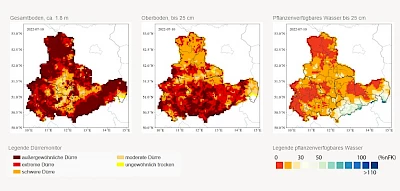
Based on the data of the UFZ Drought Monitor of the Helmholtz Centre for Environmental Research, the EXPRESS project publishes regularly updated maps on the drought of total soil and topsoil as well as on plant-available water in Saxony, Saxony-Anhalt and Thuringia.
Project Call WIR! - 1st DMPL Call to submit project ideas
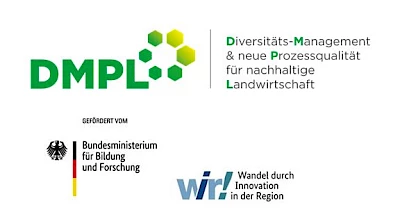
The background to the call is the award of the WIR! funding programme for the DMPL innovation alliance and thus the possibility of funding innovative research and development projects (R&D) in the entire value chain from the producer to the consumer, with a focus on agriculture.
The call is open to all topics within the entire field of innovation. There is particular interest in practice-oriented collaborative projects with a clearly recognisable R&D character. Particular importance is attached to the following topics:
- Agri-photovoltaics
- Early recruitment of young people for agriculture (agricultural education)
- Value chain from producer to consumer
- Value chain-oriented ecosystem services for agriculture
- Value-added agroforestry systems
- Field robotics and swarm systems
The aim is to contribute to the "DMPL strategy" by supporting industrial, economic, agricultural and/or scientific partners in western Saxony and to promote structural change in the region.
Sustainable agriculture with agroforestry systems
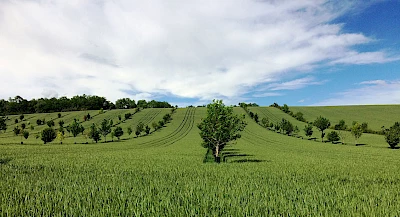
The Federal Ministry of Food and Agriculture (BMEL) intends to fund model and demonstration projects within the framework of a call for proposals on the topic of "Sustainable agriculture with agroforestry systems". The funding is provided through the "Renewable Resources" funding programme and underpins the funding priority "Development of concepts for sustainable production and utilisation of renewable resources, with special consideration of water as a resource". Applications will be accepted until 31st of August 2022.
Events summer/autumn 2022
22.-24.07.2022, Freiburg | AgriKultur Festival 2022 learn more
27.-28.07.2022, Nürnberg | Kongress StadtLandBio learn more
05.08.2022, online | AgiL-Sprechstunde für regionale Wertschöpfung learn more
01.09.2022, online | 6. BZfE-Forum: Ernährung 4.0 - wie die Digitalisierung unser Essen beeinflusst learn more
02.09.2022, online | AgiL-Sprechstunde für regionale Wertschöpfung learn more
03.09.2022, Dresden | Kraftwerk Mitte Fest [OLGA will be there with an information stand on pulses! ;-)] learn more
09.09.2022, online | DMPL-Innovations-Workshop zum Thema Agri-Photovoltaik (im Rahmen des Förderaufrufes für innovative Projekte mit FuE-Charakter für die regionale Landwirtschaft in Sachsen) learn more
09.-10.09.2022, Görlitz | Denksalon Ökologischer und Revitalisierender Stadtumbau "Stadt - Region - Mensch": Transformation durch Zuwanderung in kleinere Städte und peripherisierte Regionen: Erfordernisse, Chancen, Erfahrungen mehr Info
15.09.2022, Weißenfels/Köthen | 1. Mitteldeutscher Agroforst-Feldtag learn more
15.09.2022, Rostock | Fachtagung: Gute Stadt-Land-Beziehungen für eine nachhaltige Entwicklung in Mecklenburg-Vorpommern learn more
18.09.2022, Tharandt | Tag der Kulturpflanzenvielfalt learn more
19.-20.09.2022, Leipzig | Stadt-Land-Plus Statuskonferenz 2022 learn more
21.-22.09.2022, Dresden | IOER Jahrestagung 2022 "Raum & Transformation: Lebenswerte Zukünfte" learn more
04.11.2022, Dresden & online | SAVE THE DATE! Abschlusskonferenz Innoland Sachsen: Innovative Modelle für eine nachhaltige und regionale Wertschöpfung - Synergien und Potenziale der Solidarischen Landwirtschaft in Sachsen learn more
Imprint
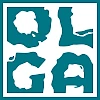
 This newsletter is published by the City of Dresden as the responsible partner for public relations in the OLGA project, which is funded by the Federal Ministry of Education and Research as part of the Stadt-Land-Plus programme.
This newsletter is published by the City of Dresden as the responsible partner for public relations in the OLGA project, which is funded by the Federal Ministry of Education and Research as part of the Stadt-Land-Plus programme.
City of Dresden
Mayor's Office
Dr.-Külz-Ring 19
01067 Dresden
Editor: Anke Hahn | Contact
With contributions by Michaela Hildebrand, Prof. Doris Krabel, Ramune Pansa, Thomas Schindhelm and Manuel Wewer
If you have not yet subscribed to the newsletter, you can do so HERE.
If you no longer wish to receive the newsletter, you can unsubscribe HERE at any time!
